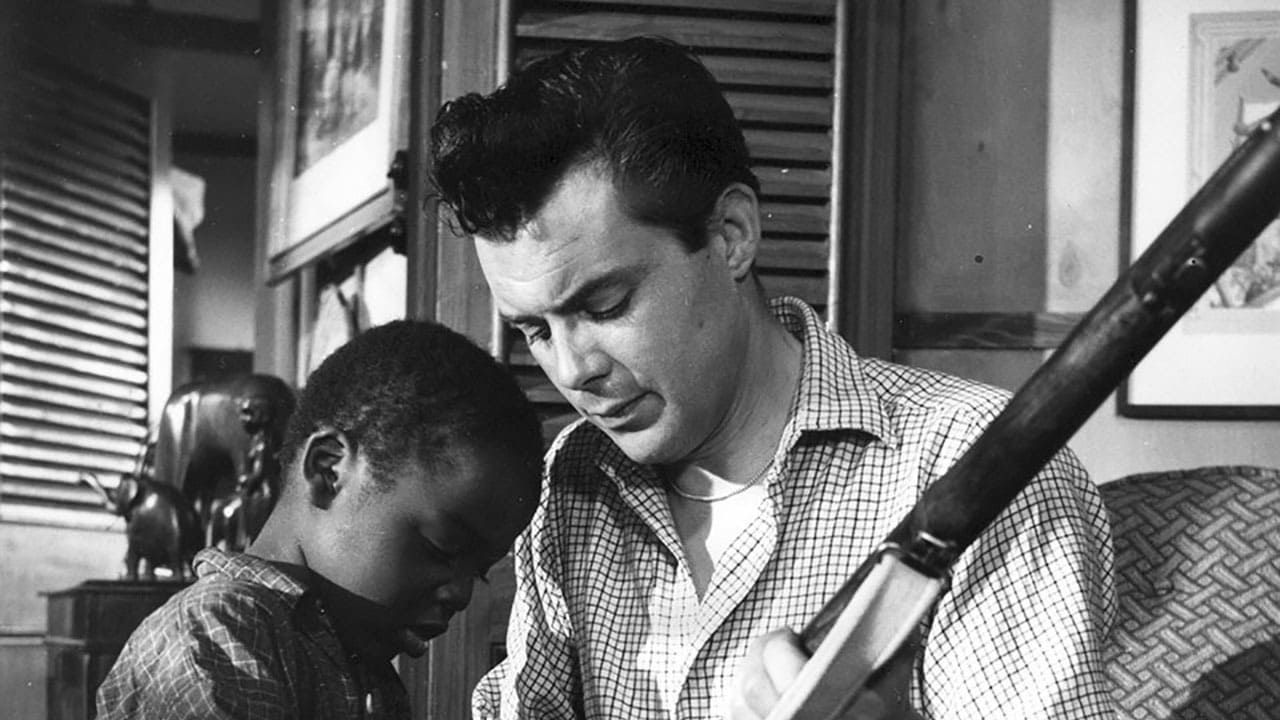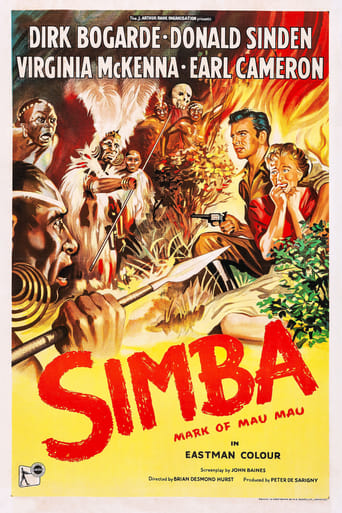

It pinpoints all the problems of colonialism, how it has to turn the natives against the intruding masters, while they have their defense as well - they do bring help and order to the country with education and cultivation, and if the natives react with violence they earn being called stupid.The most fascinating scenes are always with the natives, though, especially every scene with doctor Karanja (Earl Cameron) who is the backbone of humanity in the film, placed in a very sensitive position as working with the whites to help his own but disowned by his own father. The dramatic finale caps the solemn drama, and as in all real stories, that's where the real story begins, the last shot being of the one innocent person and foremost victim of the whole conflict.The initial scene sets the theme and the tension, which lasts throughout and is never really resolved, the conflict going on still today, as white farmers of South Africa and Zimbabwe are being murdered still today. Both Dirk Bogarde and Donald Sinden make rather poor figures of stolidity, and you never really see them come to some deeper senses. Virginia McKenna as always brightens up the arduous drama with her beauty and crowns the film with a sustained romance - at least that will continue after the film. I can't raise any objections against this film, which honestly gives such a full picture of the Mau-Mau situation as was possible and calls for important attention to the great social problems of Africa, which mainly consist of inherent and almost incurable superstition.
... View MoreI don't intend to review the film in its entirety, but rather discuss its treatment of race relations. There is little doubt that it was transgressive by the standards of its time, and, also, it was incredibly raw and often offensive in terms of rank racism, but it was also refreshingly honest and unvarnished. We saw the ugliness for what it was on all sides. We saw the complication. We saw how truly decent people could hold a variety of view and then change them for the better. Most importantly,we saw humanity. I don't think we can achieve that by sanitizing and political correctness. I am grateful that this film is available for viewing and consideration. Just the notion of an accomplished black doctor standing up to a white man in such an astonishing way circa 1955 was amazing. We didn't see anything like it until Sydney Poitier uttered his famous line, "They call me Mr. Tibbs."
... View MoreThere are others on this site who can more aptly discuss the politics present in this film, so I won't do it."Simba" stars Dirk Bogarde, Virginia McKenna, and Donald Sinden. It is the story of an Englisman, Alan Howard (Bogarde) who visits his brother in Africa and learns that he has been murdered by the Mau Mau. He decides to stay and work his brother's farm and renew his relationship with Mary (McKenna), an old love who lives in Africa with her British parents. As the fighting goes on, prejudices on both sides are voiced, and Mary and Alan find themselves on opposite sides.Though the acting is good, the movie is a mess for some technical reasons, not to mention the skewed viewpoint of the film. The producer and director were somehow under the impression that Jack Hawkins was going to star in the movie. Consequently, they filmed in Kenya using a double for Hawkins, who was six inches taller than Dirk Bogarde. While in Kenya, they used a tall blond man as a double for the police inspector, but when they returned to England, they couldn't match him up with anyone. When Donald Sinden walked into Pinewood Studios, he had his hair streaked for another film, and the producer asked him if he would dye his hair. Thus, he got the role.The landscapes are beautiful, but one is aware that the actors weren't in Africa, and when they're on the screen, the landscapes are projections.Simba is an interesting film, and as a fan of Dirk Bogarde, I'll watch him in anything, but this isn't a great movie.
... View MoreDirk Bogarde, poorly regarded brother of a Kenyan farmer, comes to Kenya to find his brother killed by the savage Mau Mau group led by the mysterious SIMBA. Will he find true love, a sense of responsibility, and a proper regard with the indigenous people who are revolting against colonial rule? Though this a painfully sincere movie illustrating the hardships of being a white farmer in a countryside full of people who do not want white farmers, its hard not to be somewhat appalled by a movie that poses the question -- do the native Kenyans who were part of the Mau Mau deserve to be regarded as men, or simply as savages. While, fortunately, it does feel like the movie makers are making the case for thinking of the Kenyans as humans, it's a bit of a close issue, as the lead farmer is allowed to rant about savages, and the police commissioner trying desperately to keep order, seems to have ill-concealed contempt for the natives revolting against his authority.The acting is all good, and the direction keeps this particular plot moving. The opening sequence is shocking. The final sequence really is quite tense, and the way the filmmakers choose to end this film makes some rather unpleasant and unpalatable points quite well.The problem is this. Do you really want to see a movie made from the point of view of the earnest but colonialist occupiers? Are you willing to tolerate something that looks like the film the French in Battle of Algiers would have made, had they access to a camera and clipped British accents? If you aren't, don't watch. You really will get angry.But, if you want to see viewpoint of the English establishment just before colonialism was ended, this might be as good a place as any to find it.
... View More